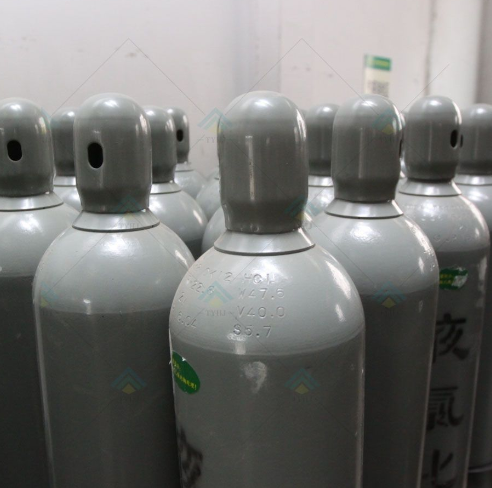Hydrogen chloride (HCL) is a colorless specialty gas with a pungent odor. Hydrogen chloride can irritate the skin, nose, eyes, throat, and larynx. Exposure to liquid hydrogen chloride may cause frostbite. When using hydrogen chloride (HCl) gas, several precautions should be taken to ensure safe handling and minimize potential risks.
Hydrogen chloride gas should only be used in well-ventilated areas or under proper fume hoods. Ensure that the workspace has adequate airflow to prevent the accumulation of HCl gas, which can be corrosive and irritating to the respiratory system.
Individuals handling HCl gas should wear appropriate personal protective equipment, including chemical-resistant gloves, safety goggles or face shield, and a lab coat or protective clothing. These measures help protect against contact with the gas or its vapors, which can cause severe burns or eye irritation.
Utilize gas detection systems or air monitoring equipment to continuously monitor the concentration of HCl gas in the working environment. This helps in early detection of any leaks or releases and allows for prompt action to prevent exposure.
Regularly inspect the equipment and systems handling HCl gas for potential leaks. Implement effective leak detection measures and promptly address any leaks or releases. Properly maintain and repair equipment to prevent accidents or uncontrolled releases.
Hydrogen chloride gas cylinders should be securely stored in well-ventilated areas, away from ignition sources, heat, and incompatible substances. Follow proper handling procedures during transportation, ensuring that cylinders are secured and protected from physical damage.
Avoid contact between hydrogen chloride gas and reactive substances, such as strong bases, oxidizers, or flammable materials, as it may lead to hazardous reactions or the formation of toxic gases.
Establish emergency response procedures and make sure all personnel are aware of them. Provide training on handling and responding to HCl gas leaks, releases, or exposure incidents. Keep emergency eyewash stations, safety showers, and spill control equipment readily accessible.
Follow good chemical hygiene practices when working with HCl gas, including proper handling, storage, and disposal of chemicals. Minimize the potential for cross-contamination by ensuring that equipment is cleaned thoroughly after use.

Clearly label containers and equipment containing HCl gas with appropriate warning signs or labels indicating the presence of a hazardous substance. This helps raise awareness and reminds personnel to exercise caution when working with or around the gas.
Ensure that individuals working with hydrogen chloride gas are adequately trained on its properties, hazards, and safe handling practices. Regularly update their knowledge through refresher training sessions.
Remember, hydrogen chloride gas is corrosive, toxic, and can cause severe health effects if not handled properly. By following these precautions and safety measures, the risks associated with using HCl gas can be minimized, promoting a safe working environment.
If you want to know more information about hydrogen chloride gas, please contact us. We will provide professional answers.